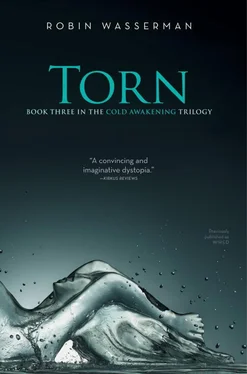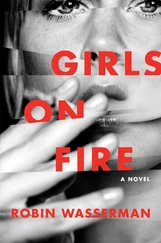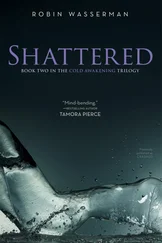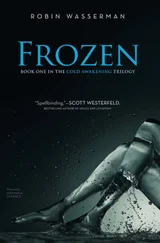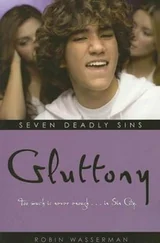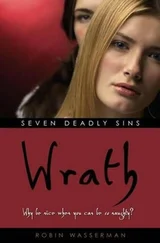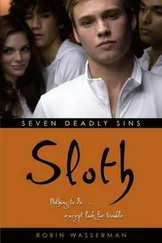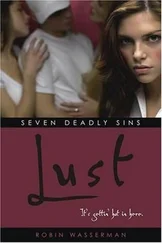It was too quiet there; it was too easy. Too still. After everything that had happened, I needed something else—not just the relief of Riley’s arms around me, but the relief of adrenaline and fear and forgetting. And then the answer was obvious.
It wasn’t our place; it wasn’t my place. It had belonged to Jude, once; it had belonged to all of us. I hadn’t been back there in nearly a year, because I had been too afraid. It was the place to start over again, because it was the place where things had gone wrong.
I keyed in the coordinates. Recognizing them, Riley tugged me toward him, and we curled up in the front seat as the car veered to the right, taking us west, off the highway, into the country, away.
The waterfall was tamer than I remembered. But it was wild enough.
Riley looked uncertain. “Why here?”
He knew how I felt about the waterfall. “I want us to jump,” I said.
“I thought you wanted to talk.”
“After.”
I led him to the water. We took off our shoes, peeled off our clothes, and waded out to the edge of the precipice, buffeted by wind. The water roared. I could have shouted all my secrets and let the wind carry the words away.
I held out my hand. He grabbed it, squeezed, then let go.
There was no point in counting down. No point in being afraid. I’d leaped from planes. I’d leaped from cliffs. This was no different. If anything went wrong, my brain, my self, was safely copied and stored. Whatever happened to this body, BioMax had Lia Kahn, to do with whatever they wanted. She was their toy. I belonged to them.
I closed my eyes. Lifted my arms to the sky.
Jumped.
It was everything I needed. It was mindless, breathless, timeless, twisting and flailing and falling. The pleasure of the flight met the pain of the rocks. The water carried me down, carried me away. Sucked me under the falls, into a churning storm, the surface lit by a sheet of white water, the river cycloning around me, driving me down, dragging me up, then down and up again, like a bobbing cork, like a doll, like a body.
It was the moment that my brain kicked in, that I thought, Auden , and remembered his body sailing over the lower falls, floating at the bottom, facedown, breathless.
I kicked furiously, fought off the storm, and broke free to the surface of the icy river. I floated, ears submerged, eyes to the gray sky.
That’s when I saw Riley, his form a shadow against the sun, standing at the edge of the falls, looking down.
“So, you didn’t jump.”
“I didn’t jump.”
We sat cross-legged on the riverbank. Water gushed down from above, its spray misting the air.
“That’s okay,” I said.
“I know it’s okay.” He was angry. At himself, for freezing? At me, for dragging him here?
At me, for jumping, and leaving him behind?
There was a long pause. “Go ahead,” he finally said, sullen. “Ask.”
“Fine. Why didn’t you?”
He hunched his shoulders, scraping his knuckles against each other. “You know why Jude started this?”
“To remind ourselves of what it means to be a mech,” I recited, the familiar words strange in my mouth. It wasn’t so long ago that I’d given this speech on a daily basis. “With absolute control must come absolute release. Release from gravity, release from fear.”
“Release from death.”
Right. I’d left out the most important one, the bright line dividing mech and org. The absence that defined us. No end of the line, no period on our sentence. Endless days and years of downloading from one body to the next. We jumped from the waterfall because we could , because we could do anything. The drop wasn’t steep enough to permanently damage our bodies—they were too well constructed for that—but we jumped because it didn’t matter. If something went wrong, if the body were crushed or drowned or torn apart, we would remain intact. We jumped to defy death, as we defied it every day, by living on, far past our sell-by date.
“I bought it,” Riley said. “But since the fire…”
I waited him out. With Riley it was the only way.
“It’s not the same,” he finally said. “Now that I know what it’s like.”
I understood, or thought I did, but only because I’d become an expert at translating Riley’s begrudging admissions of inner life. So, spitting in the face of death was less fun once you’d died yourself.
Not org death—we’d all been through that. But mech death. Waking up yet again in the BioMax lab, with no memory of how you’d ended up there, with a gap in the story of your life. Knowing yourself to be a copy of a copy. It was fear of that moment that prevented me from downloading into a new, custom-made body that would look like the Lia I used to be. It was the fear that gripped me every time I stood on a ledge, the fear I needed , if the leap was going to mean anything. It was one thing to know you couldn’t die; it was another thing to believe it.
Maybe now Riley didn’t.
Since the fire, I’d spent so much time trying to convince myself he wasn’t a different person. I hadn’t thought to convince him. Even though every time he looked in the mirror, he saw someone different staring back at him. Because of me. Because I’d given him back something I thought he wanted, without bothering to ask.
“I’m sorry,” I said. “We shouldn’t have come.”
He shook his head. “I’m just being stupid.”
“You’re not.”
“Jude’s right, you know. They have the power. If something happens, and they don’t want to put you into a new body, they don’t have to. They can do anything they want. They always do.”
I wondered if “they” meant BioMax, or if “they” meant everyone with more power, with more credit, everyone who’d ever used him as a tool or a toy, just because they could. It was nothing new for him; it was status quo.
Maybe that’s why, when I put my hands over his and told him what we’d found at BioMax and what the corp was doing to our friends, maybe to us, he wasn’t surprised. “Of course” was all he said. “Of course they would.”
I’d wanted outrage and shock. Maybe I’d even wanted violence: Riley throwing me off, leaping to his feet, out for blood. But this was more of what I’d gotten when I told him about my father: resigned acknowledgment that he’d been right about the world all along. Surprise that I hadn’t seen it coming.
“I know I promised I wouldn’t do anything,” I said, when he didn’t ask any follow-up questions. “But I had to.” And you made me lie to you.
“I know,” Riley said. “I get it. I figured you would.”
“That’s why you went to Jude behind my back?”
Riley issued a hard laugh. “Not like he listened.”
“You should have trusted me.”
He raised his eyebrows. “You were lying.”
“No, I mean you should have trusted me to decide for myself.”
A pause. “Maybe.”
But that’s what we did: We decided for each other. We lied; I lied. Maybe that was why I’d brought him here, because last time we’d been in this place, we’d been strangers. This was a place for a fresh start. No more lies.
First I kissed him. He closed his eyes, but I kept mine open, sweeping my gaze across his skin, trying to memorize the angle of his cheekbones, the crinkles at the edges of his eye, the way the skin shallowly dimpled below his ear.
“What was that for?” he asked, when I finally pulled back. “Not that I’m complaining.”
“I need to tell you some things,” I said, before I could think better of it.
“There’s more? What’s left for them to do?”
“Not them. Me.”
The worst part? That didn’t surprise him either.
Читать дальше
